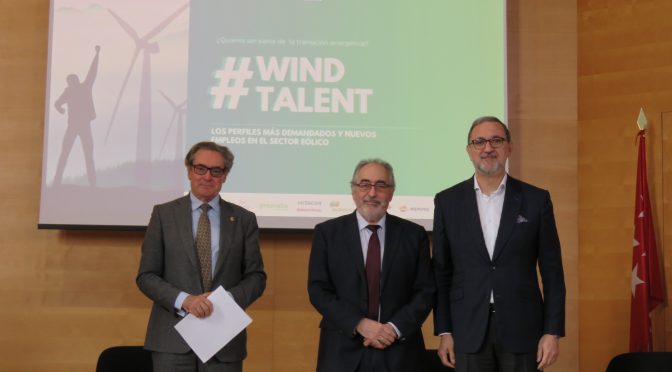Spain occupies fourth position in the ranking of European countries for renewable employability and third position in the wind sector
The Spanish wind sector employs more than 40,000 people in Spain, creating five times more employment than conventional technologies, and with an annual increase in employment of 15%. The current employment figure must double by 2030 to meet the objectives indicated in the PNIEC. For the wind sector, it is key to present the job offer in its different areas and provide students with opportunities to develop their professional careers.
The Wind Business Association (AEE) in collaboration with the Polytechnic University of Madrid (UPM), celebrates a new edition of #WindTalent, the annual reference event that has been held since 2019 and brings together representatives of HR, Talent and Training from companies in the wind sector and young professionals who have chosen wind power as a sector in which to start their professional career, as well as students who in their last stage of training decide on their professional career. More than 100 students from their final engineering courses meet at #WindTalent.
The wind sector is strategic for the Spanish economy. Companies in the sector need to incorporate new professionals for both land and marine in the next decade. The Spanish wind sector has a strong industrial network with pioneering companies and world leaders in innovation and technology, with highly specialized job creation. Employment in a technological sector such as wind energy requires a significant level of training. Furthermore, the employability of students specializing in renewable energy is very high compared to other industrial sectors.
2024 is the year of the deployment of floating offshore wind energy on our coasts, being an opportunity for Spain due to the creation of new professions and a greater demand for engineers. The implementation of floating offshore wind requires qualified employment in multiple technical disciplines, for which professional training constitutes a fundamental development vector. Furthermore, this new development of offshore wind will create synergies with other industrial activities, such as the naval or port industries, among others. The PNIEC identifies as specific challenges the installation of at least 3 GW of offshore wind in 2030 and to achieve this we must have the first auction in this year 2024. The celebration of #Windtalent at the Naval Higher Technical School could not have a better scenario.
The objectives of this edition are mainly two:
Present the current needs of companies in the wind sector in their selection of professionals, trying to give a concrete vision to students of the existing professional opportunities in the wind sector.
Inspire students to motivate the selection of the wind sector to develop their working life.
One of the main themes of #WindTalent is to answer the question: Are young people being trained in the new jobs that will emerge during the energy transition? Currently, we are experiencing a moment of growth in the renewable sector that translates into a very high peak demand for talent. We are facing a unique situation of professional growth and opportunities. Spanish companies in the wind energy value chain constitute a dynamic, innovative business network that is a world leader in innovation and technology, generating highly specialized and well-paid employment.
The companies that have participated in this edition have been Navantia Seanergies, Institute of Knowledge Engineering, Naturgy, RIC Energy, Greenalia, Iberdrola, Ocean Winds, Renantis and Esteyco. Among the topics analyzed during the conference were the profiles of the most in-demand professionals, the training that is needed, whether the training is adapted to sectoral needs and how technology impacts, among other topics.

There is a firm commitment to collaboration and synergies with companies and educational centers for the training of future professionals. It is estimated that around 5,000 new green jobs will be created each year, in Spain alone, currently being the fourth country in the European ranking of employability in renewables and third in the wind sector (source: EurObser’ER).
Juan Virgilio Márquez, general director of AEE, opened the day by indicating that “Spain is an international benchmark because it is one of the few countries with 100% of the wind energy value chain. This privileged position is not free since the wind industry is a fundamental pillar for the competitiveness of the economy, industrial and technological autonomy and the creation of qualified employment. We are committed to attracting the best talent to the wind sector and, of course, retaining them thanks to attractive professional careers.


